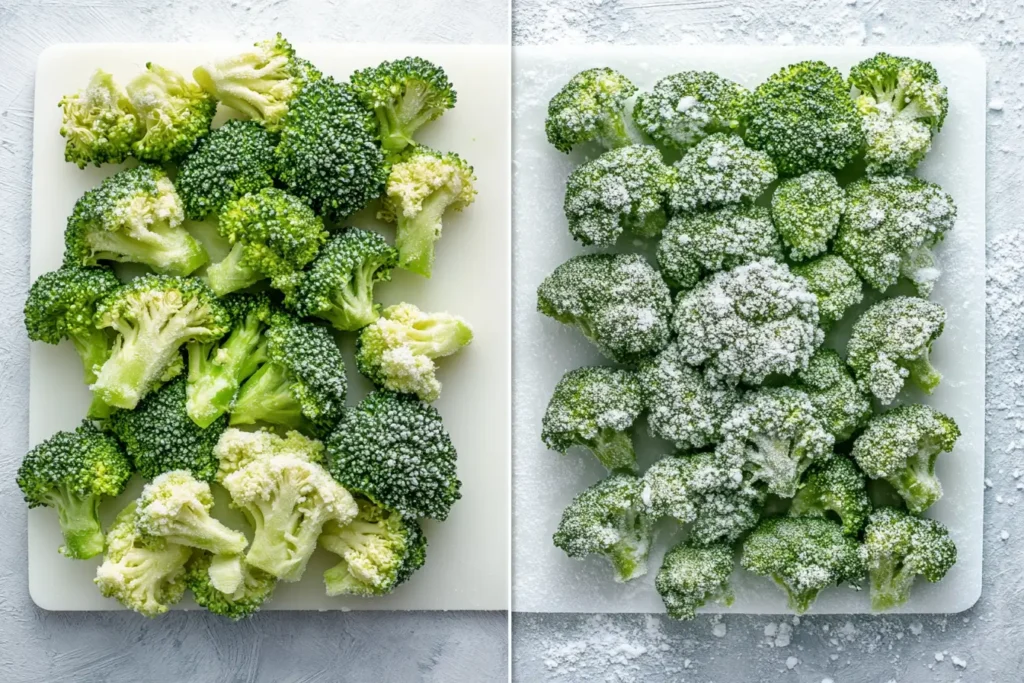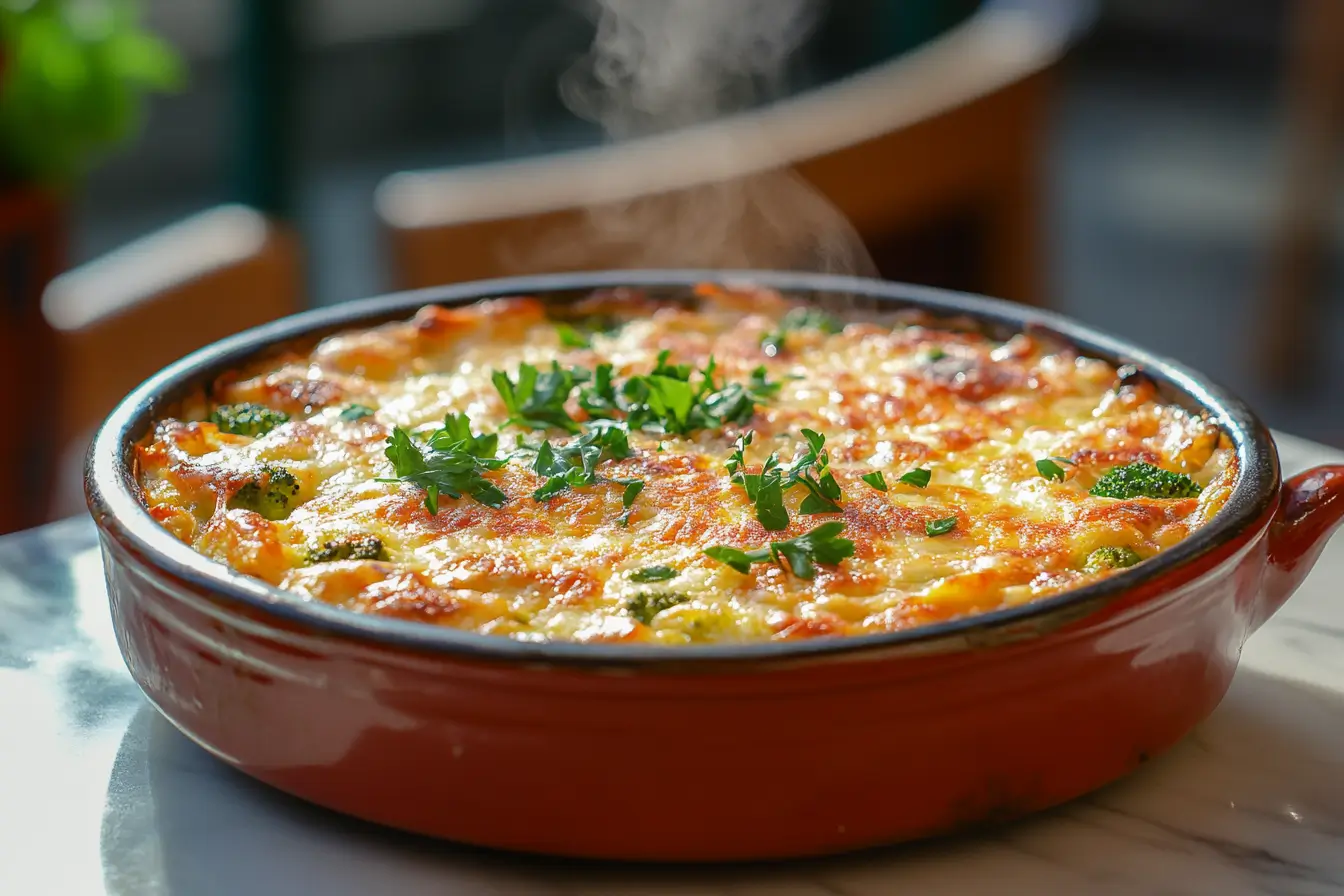Broccoli is a staple ingredient in casseroles, beloved for its vibrant color, nutritional benefits, and mild taste that pairs well with cheesy, creamy, or savory dishes. But when it comes to preparing casseroles, many home cooks face the age-old dilemma: is it better to use fresh or frozen broccoli in a casserole? This article dives deep into this culinary question, exploring differences in nutrition, taste, cost, and convenience to help you make the right choice for your next dish.
Introduction to Broccoli in Casseroles – Is It Better to Use Fresh or Frozen Broccoli in a Casserole?
Broccoli has become a kitchen favorite for those who love hearty, vegetable-packed casseroles. Its versatility and health benefits make it a natural addition to these comfort food classics. Yet, is it better to use fresh or frozen broccoli in a casserole? This question often arises as each option has its own strengths and weaknesses.
The Popularity of Broccoli in Casserole Dishes
Broccoli casserole recipes are a household classic, often featuring creamy cheese sauces, crunchy toppings, or mixed vegetables. They’re celebrated for being easy to prepare, family-friendly, and perfect for feeding a crowd. Broccoli’s mild flavor allows it to blend seamlessly with various ingredients, whether it’s paired with chicken, rice, or pasta.
The Debate: Fresh vs. Frozen Broccoli – Is It Better to Use Fresh or Frozen Broccoli in a Casserole?
When assembling the perfect casserole, cooks often debate whether fresh broccoli or frozen broccoli is better. Is it better to use fresh or frozen broccoli in a casserole? While fresh broccoli is prized for its crisp texture and garden-fresh taste, frozen broccoli is known for its convenience and longer shelf life. Both options bring unique qualities to the table, making the choice highly dependent on factors like preparation time, recipe requirements, and personal preference.
Nutritional Comparison of Fresh and Frozen Broccoli
When deciding whether to use fresh or frozen broccoli in a casserole, understanding the nutritional differences is crucial. Both forms offer significant health benefits, but there are subtle distinctions worth noting.
Frozen broccoli, like many other frozen vegetables, retains most of its nutrients due to the flash-freezing process. This makes it an excellent choice for preserving vitamins and minerals even after long storage. For more details on the health benefits of frozen vegetables, check out this comprehensive article from Healthline.
Vitamin and Mineral Content
Fresh broccoli is renowned for its high vitamin C content. However, studies indicate that vitamin C begins to degrade immediately after harvest. For instance, fresh broccoli can lose up to 56% of its vitamin C within the first seven days if stored at room temperature.
In contrast, frozen broccoli is typically blanched and flash-frozen shortly after harvesting, which helps preserve its nutrient profile. While blanching can cause some loss of water-soluble vitamins, the freezing process effectively locks in most nutrients.
Impact of Freezing on Nutrient Retention – Is it Better to Use Fresh or Frozen Broccoli in a Casserole?
The freezing process has a mixed impact on nutrient retention. While some vitamins, like vitamin C, may decrease during blanching, others remain relatively stable. Notably, frozen broccoli has been found to contain higher levels of riboflavin (vitamin B2) compared to its fresh counterparts. This suggests that frozen broccoli can be just as nutritious, if not more so, than fresh broccoli in certain aspects. Is it better to use fresh or frozen broccoli in a casserole? From a nutritional standpoint, both have their advantages.
Health Benefits of Broccoli in Diet
Regardless of whether you choose fresh or frozen, incorporating broccoli into your casseroles provides numerous health benefits. Broccoli is rich in fiber, antioxidants, and essential vitamins like K and A. These nutrients support immune function, promote healthy digestion, and may reduce the risk of chronic diseases. Therefore, when considering Is it better to use fresh or frozen broccoli in a casserole? both options contribute positively to a balanced diet.
| Nutrient/Benefit | Fresh Broccoli | Frozen Broccoli | Key Health Benefits |
|---|---|---|---|
| Vitamin C | Higher when fresh and recently harvested. | Slightly lower due to blanching and freezing. | Boosts immune function, supports skin health, and acts as a powerful antioxidant. |
| Fiber | Naturally high and unchanged during cooking. | Similar to fresh, retained after freezing. | Promotes healthy digestion and supports heart health. |
| Vitamin K | High in fresh broccoli. | Retained well during freezing. | Essential for bone health and proper blood clotting. |
| Antioxidants | Contains high levels (e.g., lutein and sulforaphane). | Retained during freezing process. | Protects cells from damage, reduces inflammation, and supports detoxification. |
| Riboflavin (Vitamin B2) | Slightly lower due to transport/storage loss. | May be higher due to preservation in freezing. | Supports energy production and maintains healthy skin and eyes. |
| Calcium | Unaffected by storage or freezing. | Unaffected by freezing process. | Strengthens bones and teeth, supports muscle function. |
| Convenience | Requires washing, trimming, and blanching. | Pre-washed, trimmed, and ready to use. | Simplifies meal prep while retaining nutritional benefits. |
| Cost Efficiency | Can be expensive off-season. | Affordable year-round with stable prices. | Makes healthy eating more accessible, especially on a budget. |
| Shelf Life | Lasts 5–7 days when stored properly. | Lasts months when frozen and stored correctly. | Reduces food waste and provides consistent availability. |
This table highlights the differences in nutrients and convenience between fresh and frozen broccoli while emphasizing their shared health benefits. Both are excellent choices for casseroles and other meals!
Taste and Texture Differences in Casseroles
The choice between fresh and frozen broccoli can significantly influence the taste and texture of your casserole. Understanding these differences will help you decide is it better to use fresh or frozen broccoli in a casserole.
Fresh Broccoli: Flavor Profile and Mouthfeel
Fresh broccoli offers a crisp texture and a slightly bitter, earthy flavor. When used in casseroles, it maintains its firmness, providing a pleasant contrast to softer ingredients. However, it’s essential to blanch fresh broccoli before incorporating it into your casserole to ensure even cooking and to preserve its vibrant color.
Frozen Broccoli: How Freezing Affects Taste and Texture
Frozen broccoli undergoes blanching before freezing, which partially cooks the vegetable. As a result, it tends to have a softer texture once thawed and cooked. The freezing process can also concentrate the natural sugars in broccoli, leading to a slightly sweeter taste.
In casseroles, frozen broccoli blends seamlessly with other components, especially in creamy or cheesy dishes.
Influence on Overall Casserole Quality
When determining is it better to use fresh or frozen broccoli in a casserole, consider the desired outcome of your dish. If you prefer a casserole with distinct, firm vegetable pieces, fresh broccoli is the way to go. Conversely, if a uniform, tender texture is desired, frozen broccoli may be more suitable. Additionally, using frozen broccoli can save preparation time, as it’s pre-washed and chopped, offering convenience without significantly compromising on taste or nutrition.

Convenience and Preparation
When pondering is it better to use fresh or frozen broccoli in a casserole, convenience and preparation time are key factors to consider. Both options have their own set of advantages that cater to different cooking needs.
Preparation Time for Fresh Broccoli
Using fresh broccoli in your casserole requires a bit more prep work. You’ll need to wash, trim, and cut the broccoli into uniform pieces to ensure even cooking. Additionally, blanching the broccoli before adding it to the casserole is recommended to preserve its color and texture. This extra step can add to your overall preparation time, which might be a consideration for those with busy schedules.
Ease of Using Frozen Broccoli – Is it Better to Use Fresh or Frozen Broccoli in a Casserole?
Frozen broccoli, on the other hand, offers a high level of convenience. Since it’s pre-washed and pre-cut, it can be added directly to your casserole, reducing prep time significantly. Moreover, frozen broccoli is available year-round, making it a reliable option regardless of the season. Is it better to use fresh or frozen broccoli in a casserole? If convenience is a priority, frozen broccoli is a hassle-free choice. However, it’s essential to thaw and drain the broccoli properly to prevent excess moisture from affecting the consistency of your casserole.
Storage and Shelf Life Considerations
When it comes to storage, frozen broccoli has a clear advantage. It can be kept in the freezer for several months without losing quality, allowing you to stock up and have it readily available. Fresh broccoli, however, has a shorter shelf life and needs to be used within a week of purchase to maintain its freshness. This means more frequent trips to the grocery store, which might not be ideal for everyone.
For more delicious recipes and tips on incorporating broccoli into your meals, check out our Chicken Broccoli Rice Casserole article.

Cost Analysis: Fresh vs. Frozen Broccoli
Another important aspect to consider when deciding is it better to use fresh or frozen broccoli in a casserole is the cost. Budget constraints often influence our choices in the kitchen, and understanding the price differences can help in making an informed decision.
Price Variations and Budget Considerations
Fresh broccoli prices can fluctuate based on seasonality and availability. During peak seasons, it might be more affordable, but off-season prices can be higher. In contrast, frozen broccoli prices tend to remain relatively stable throughout the year, providing a consistent and often more budget-friendly option. Additionally, purchasing frozen broccoli in bulk can lead to further savings, making it an economical choice for families.
Seasonal Availability and Its Impact on Cost – Is it Better to Use Fresh or Frozen Broccoli in a Casserole?
The cost of fresh broccoli is heavily influenced by its seasonal availability. In regions where broccoli is grown locally, prices drop during the harvest season due to abundance. However, in off-peak times, reliance on imports can drive prices up. Is it better to use fresh or frozen broccoli in a casserole? If budget and availability are concerns, frozen broccoli circumvents this issue, as it’s processed and stored shortly after harvest, ensuring availability and stable pricing year-round.
Waste Reduction and Portion Control
Using frozen broccoli can also contribute to reducing food waste. Since it’s already prepped and can be portioned out as needed, you’re less likely to have unused parts that might spoil. Fresh broccoli often comes with stems and leaves that some may discard, leading to potential waste. Moreover, if not used promptly, fresh broccoli can spoil, resulting in wasted money and food.
For more delicious recipes and tips on incorporating broccoli into your meals, check out our Chicken Broccoli Rice Casserole article.
Frequently Asked Questions (FAQs)
Choosing fresh or frozen broccoli for your casserole often sparks common questions. Here are clear answers to help you decide is it better to use fresh or frozen broccoli in a casserole?.
Can I Substitute Fresh Broccoli for Frozen in a Casserole?
Absolutely! Fresh and frozen broccoli are interchangeable in most casserole recipes. However, keep in mind that fresh broccoli might require additional prep, such as blanching, while frozen broccoli is ready to use. Both options deliver excellent results if handled correctly.
Does Fresh Broccoli Need to Be Blanched Before Adding to a Casserole?
Yes, blanching fresh broccoli is recommended. This quick boil-and-shock process helps preserve the vibrant green color, improve texture, and ensure even cooking in the casserole. Skipping this step could leave your broccoli undercooked and less appealing.
How Can I Prevent Fresh Broccoli from Making My Casserole Soggy?
Proper preparation is key. After blanching, pat the broccoli dry with a clean kitchen towel or paper towel to remove excess water. Avoid overcooking during blanching, as this can make the broccoli too soft and watery.
Are Frozen Broccoli Florets as Nutritious as Fresh Broccoli in a Casserole?
Yes! Frozen broccoli retains most of its nutrients due to the flash-freezing process. While there may be slight differences in vitamin content, frozen broccoli is a healthy and convenient option for casseroles.
Conclusion
When deciding whether to use fresh or frozen broccoli in a casserole, it boils down to your priorities. Both options bring unique benefits to the table, as illustrated throughout this article.
For a delicious casserole recipe that incorporates chicken, broccoli, and rice, check out our Chicken Broccoli Rice Casserole for a step-by-step guide to making this family-friendly dish.
Summarizing the Pros and Cons – Is it Better to Use Fresh or Frozen Broccoli in a Casserole?
Fresh broccoli offers a crisp texture, vibrant flavor, and a sense of freshness that can elevate your casserole. However, it requires more prep time and is less convenient for those with busy schedules. On the other hand, frozen broccoli is cost-effective, prepped for convenience, and always in season, making it a practical choice for quick meals.
Making an Informed Choice Based on Preferences and Needs
Is it better to use fresh or frozen broccoli in a casserole? Ultimately, your decision depends on your recipe goals and lifestyle. If you’re cooking for a special occasion and have the time, fresh broccoli may be the way to go. For weeknight dinners or when you’re short on time, frozen broccoli is an equally delicious and nutritious alternative.
Whichever you choose, both fresh and frozen broccoli are excellent additions to your casserole dishes. They provide essential nutrients, enhance the flavor, and add a hearty, satisfying touch to your meals.

